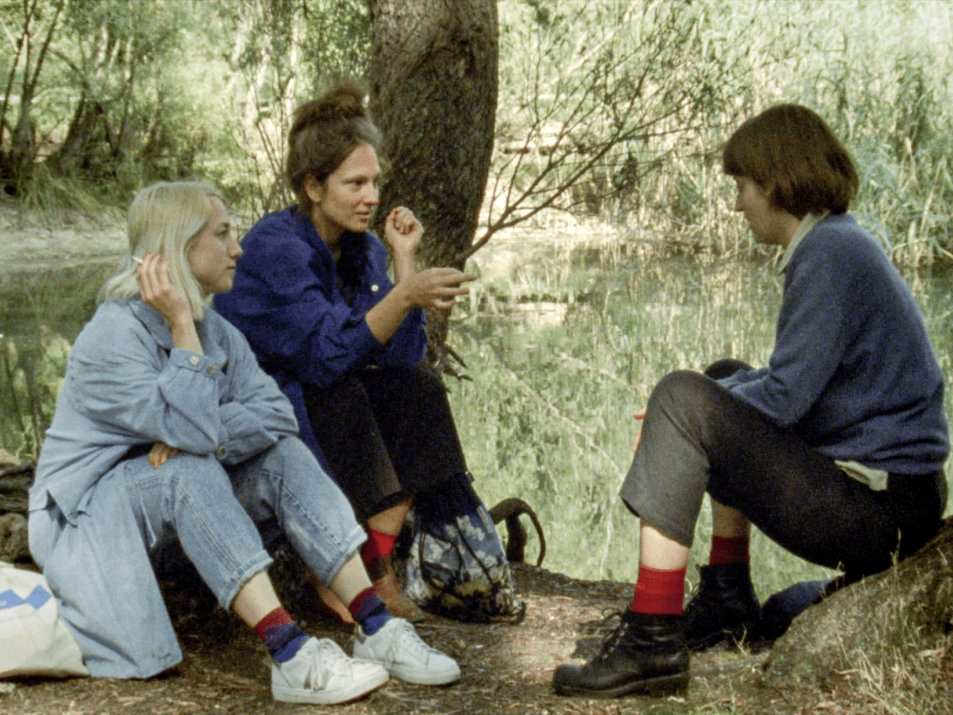
Daniela is unsure about what to do next and where to live. Mia is finishing a master's degree that she spontaneously started. Along with Natascha, another friend thinking of moving to Vienna, they wander around and talk.
“One of the characters in Classical Period, Ted Fendt’s previous film, suffers from insomnia. After reading all night, she wanders the streets and bumps into a friend. He asks, “Does it help?” She replies, “No, but it’s something to do.” This seems to be the origin story to Outside Noise, a film about wandering and insomnia. Daniela can’t sleep, whether in New York, Berlin or Vienna. Mia has similar troubles, and Natascha seems to be quietly falling apart too. Is some outside noise keeping them in this half-vigilant, half-dormant state? We all know this noise, the heavy noise of empty days, it’s everywhere, like anxiety. The film seems to be a way of dealing with this state by means of beauty, light , and movement, based on the belief that to be fair is to be poetic. Like in Classical Period, people here communicate by exchanging impressions of things other than themselves (people, books, cities, and ways of exploring them, theories, favorite museums, seasons, the moon), in order to create a world in common. Serge Daney said that we take care of the things we love, and they take care of us in return. This is one of those things. Maybe true friendship is the total absence of noise.”
Lucía Salas
Joshua Bogatin: For me, the rhythm of Outside Noise and of your other films can also feel like a stroll to no place in particular. You sort of move around with the characters, encountering various things along the way. Maybe there’s some excitement or a little bit of drama, but it never feels headed in a particular direction.
Ted Fendt: Well, the film is dealing with people [who] don’t necessarily have a clear goal, [who] are not really sure what they want to do and are not necessarily satisfied with where they are. They need some kind of change, but they’re not at the point where they can articulate that yet. I realized later that this kind of relates to what I was feeling around like 2016, 2017, 2018. I was in New York but beginning to feel unhappy there and wanted to change somehow, but didn’t know how to even express that. Then I found myself in Berlin and Vienna, so there’s [an] element of biography in there in a way.
How did you start to develop these feelings and ideas into a script? Your films can feel more like portraiture than drama at times, so I’ve been curious as to how you give a project like Outside Noise its form and shape?
Very associatively. Initially, it was gonna be just a short film where Mia would be visited by Daniela, but then Daniela came to New York for a vacation. And I said, “It’d be funny to shoot a test when you’re here, and maybe it could go in the movie.” But, of course, if it went in the movie it would be that her character’s in New York, which makes it a completely different story.
I think the film has this presentational quality to the way the scenes are shot because I was consciously trying to make this relationship between the viewer and the images really direct, without any intermediary of fiction. Like if you shoot a movie in Vancouver but it’s set in New York, you’re looking at a shot of the street of Vancouver, but in your mind you’re saying it’s New York. That’s like a filter, and I wanted something different. I wanted to allow a kind of immediacy to work.
With the very first shot of Mia in the film, where she’s lying on the bed, the character hasn’t been introduced yet, so she’s just a person on a bed, and there’s maybe the chance for the audience to have this direct experience of this person. I’m trying to get at a good, direct experience of places and people that you would only have if you went there, if you were face to face with this person, without allowing the fiction to be so much of a barrier.
Joshua Bogatin in conversation with Ted Fendt1
- 1Joshua Bogatin, ““A Good, Direct Experience”: Ted Fendt talks about Outside Noise,” Screen Slate, 25 March 2022.

